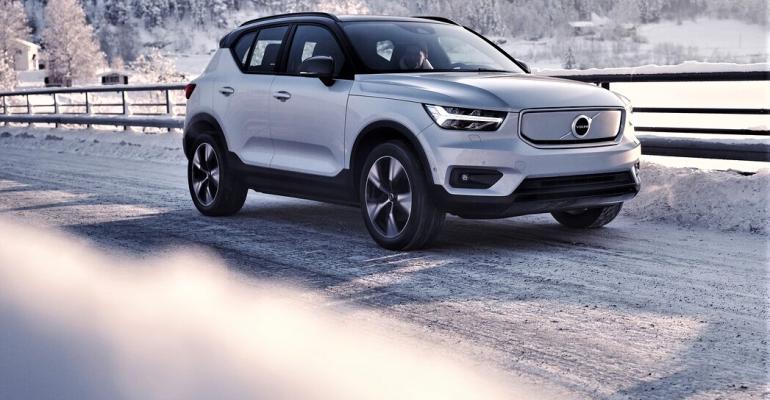BRUSSELS – The U.S. Inflation Reduction Act is pushing the European Union and the U.K. into paying more subsidies to attract battery-electric-vehicle and battery production to Europe.
While the U.K.’s Advanced Propulsion Center (APC) forecasts 5 million more BEVs globally by 2030, requiring 3,306 GWh in batteries, the U.S. and China may benefit more in production terms.
“The...Inflation Reduction Act could mean that the ambitions of automotive manufacturers in the U.K. and Europe do not materialize as quickly as they would like. Investment momentum for gigafactories is now shifting to the U.S.,” says Chris Jones, APC strategic trends manager.
But not because of weak local demand. A planned U.K. ban on new internal-combustion-engine vehicle sales takes effect in 2030, with hybrids following in 2035. https://www.gov.uk/government/news/government-takes-historic-step-towards-net-zero-with-end-of-sale-of-new-petrol-and-diesel-cars-by-2030
The EU requires zero-emission vehicles in 2035, effectively an ICE ban, apart from niche e-fuels, under an April 2023 EU regulation. As a result, the European Automobile Manufacturers’ Assn. (ACEA) says BEVs held a 13.8% market share in May 2023, up from 1% just five years ago, and from 9.6% year-on-year. Most EU markets also saw double- and triple-digit percentage gains year-on-year, including the four largest: the Netherlands (+118.4%), Sweden (+82.6%), France (+48.7%), and Germany (+46.6%).
In Germany, newly registered BEVs numbered 43,700 in May, up 47% year-on-year, meaning €1.5 billion ($1.6 billion) from the federal government’s BEV purchase subsidy budget of €2.1 billion had been spent.
Booming sales mean EU governments now are rolling back consumer-focused BEV tax breaks, such as the climate bonus scheme that Sweden ended Nov. 8 in favor of measures boosting lagging local production. And more incentives are likely after the European Commission eased rules for EU national government subsidies (state aid) in March.
EU member states have seized upon this. France now offers a green tax-credit package funding up to 40% of capital investment in battery projects and “is now leading the way” in offering subsidies, according to Philippe Vangeel, Secretary-General of the Association for Electromobility. He notes that France has secured three battery production deals (and one tentative) near Dunkirk and the nearby Gravelines nuclear power plant in northern France. Taiwan’s ProLogium is one partner, after having assessed 90 sites in 13 European countries, “comprehensively considering the support of local governments in terms of funds, talents and taxation, as well as the maturity of key material supply chains.”
But Vangeel stresses it is “too early to say” which EU country is offering the best incentive package. Hungary (to South Korea’s Samsung and SK Innovation), Slovakia (to China’s Gotion joint venture with Slovakian company InoBat) and Poland (South Korea’s LG Chem) have all clinched battery production deals.

Poland provides €95 million subsidy to South Korea’s LG Chem for battery plant expansion.
Vangeel says that in battery production “the domination of China will remain,” even in plants located in Europe: “They will move out of China and come to Europe,” with South Korean companies also being players, with its Samsung Corp. building a battery plant in Hungary, with the European Commission (the EU’s executive branch) chipping in €89.6 million ($98 million) in subsidies.
The Swedish government June 8 tasked its business promotion agency, Business Sweden, with coordinating efforts to set up large battery plants through Sept. 30, 2025. Scania CEO Christian Levin hopes the move “will mean concrete action in important matters such as permit processes, electricity grids and skills supply.”
In Germany, there are special subsidies for BEV plants developed in less-wealthy regions, with additional subsidies if the project is covered by the EU’s IPCEI (Important Projects of Common European Interest) requirements. For battery-making alone, the German government has made available a total of €3 billion ($3.4 billion) in subsidies since 2019.
Notably, Tesla, eligible for subsidization for its plant at Gruenheide near Berlin, has, according to German media reports, so far received none.
Elsewhere in Europe, Spain’s public-private partnership Strategic Projects for Economic Recovery and Transformation also is attracting investment in battery plants, notably from Volkswagen, establishing a plant in Valencia. However, Spain is expected to lose out to Somerset in the U.K. for a battery plant from India’s Tata, with several hundred million GB Pounds?? in government subsidies, a figure the U.K. government has refused to clarify. That said, the U.K.’s £850 million ($1.08 billion) Automotive Transformation Fund is not enough for the U.K. trade body, the Society of Motor Manufacturers and Traders. On June 27 it launched “Manifesto 2030: Automotive growth for a zero-emission future,” calling for conditions allowing the sector to combat “fierce global competition,” securing a tenfold hike in annual BEV production to 750,000 units annually by 2030.
Delays in building capacity in both the EU and the U.K. are threatening tariff-free bilateral BEV sales under the post-Brexit EU-U.K. Trade and Cooperation Agreement. A three-year waiver on origin rules ends Dec. 31, meaning batteries and BEVs assembled in either the EU or U.K., but with key components sourced elsewhere, will no longer qualify as local content and attract U.K.-EU trade duties.
Last month, ACEA wrote European Commission Secretary General Ilze Juhansone warning a 10% tariff on the EU’s leading export market (post-Brexit) would cost €4.3 billion ($4.7 billion) from 2024 through 2026 and requesting a three-year extension to the waiver.
Despite this widespread public largesse, these manufacturing subsidies are not universally popular among economists.
“Why would we subsidize the production of BEVs if they can be imported from places where production is cheaper?” says Joachim Ragnitz, a subsidy expert at the ifo Institute in Dresden.
Speaking to Wards, he adds that “imports would definitely create a gain in prosperity for the overall economy.” But like politicians in North America, governments think new BEV manufacturing jobs win more votes than the free market.
– with Jens Kastner in Hamburg, Germany






